No products in the cart.
Collect data from reliable sources, question its authenticity: Unicef education specialist
December 13. Students of five schools from Bengaluru presented challenges and possible solutions to achieving the SDG (Sustainable Development Goal) 4: Quality Education in India (SDGs) at the Student Voices Transforming Education Summit. Students participated in a poster demonstration and presentation event organised as a culmination of a week-long workshop conducted by NetApp, a a global, cloud-led, data-centric software company.
This year, World’s Largest Lesson (a program of Project Everyone, working in partnership with UNICEF and with the support of UNESCO) and NetApp collaborated to leverage the power of data, to help students have a voice in the transformation of education. Students were encouraged to research about the education-learning crisis and voice their ideas to transform the system with educational leaders and decision-makers. The India STEM Foundation was also an event partner.
Students of the Government Model Primary School, Channasandra made a presentation highlighting gender disparity in school education — 14 percent divide in the literacy rate among males and females in Karnataka. “There are so many challenges. If there is poverty at home, the girls are discouraged from education. If a girl child is having her periods, lack of hygienic toilets with running water supply forces them to stay home. Sometimes, parents also fear that the distance between home and school puts a girl at risk and hence dissuade her from pursuing education,” said Sowmya, a class 7 student of the school. Harsha, Sushmitha, Solomon and Suraj, all students from the same class said that gender discrimination and myths played a key role in girls being uneducated.
On being asked what they would do if they were to be the education minister for one day, Sowmya was quick to respond that she would reach to out-of-school children, seek to know why they were not enrolled in schools and address their challenges.
Among other participating schools were: Parikrama School, Christel House India, KLE Basava Residential Girls School and Sri Padmashri High School. They highlighted student suicide rates in India, use of devices for online education, tech education for women etc.
Meanwhile, Aurelia Ardito, UNICEF India Education Specialist who spoke at the event, asked students to gather information from reliable sources. “We must always question the authenticity of it whenever we are presented with data. Ask whether they speak the truth. Go by reliable sources. Also use different sources to collate data and see whether they all indicate the same. Compare with other sources which is not necessarily data,” she advised.
Ravi Chhabria, Managing Director, NetApp India said, “Technology is an equaliser. Anyone, irrespective of the background they hail from can benefit from it. While technology is changing the world around us, there is also a need to this of data critically. Data is at the core of massive change. The fact that we survived the pandemic shows how mobiles and networks helped us stay connected with the world even during difficult times. Technology acts as an enabler for change. The fact that the top 15 tech companies across the world are led by Indians must encourage more students to consider it.”















Add comment